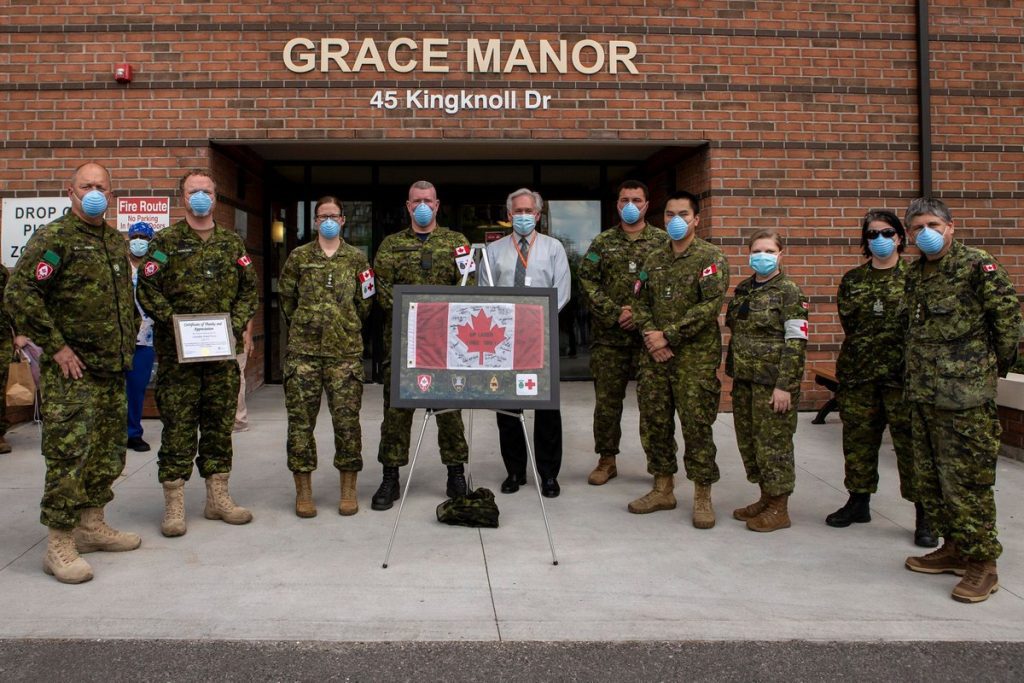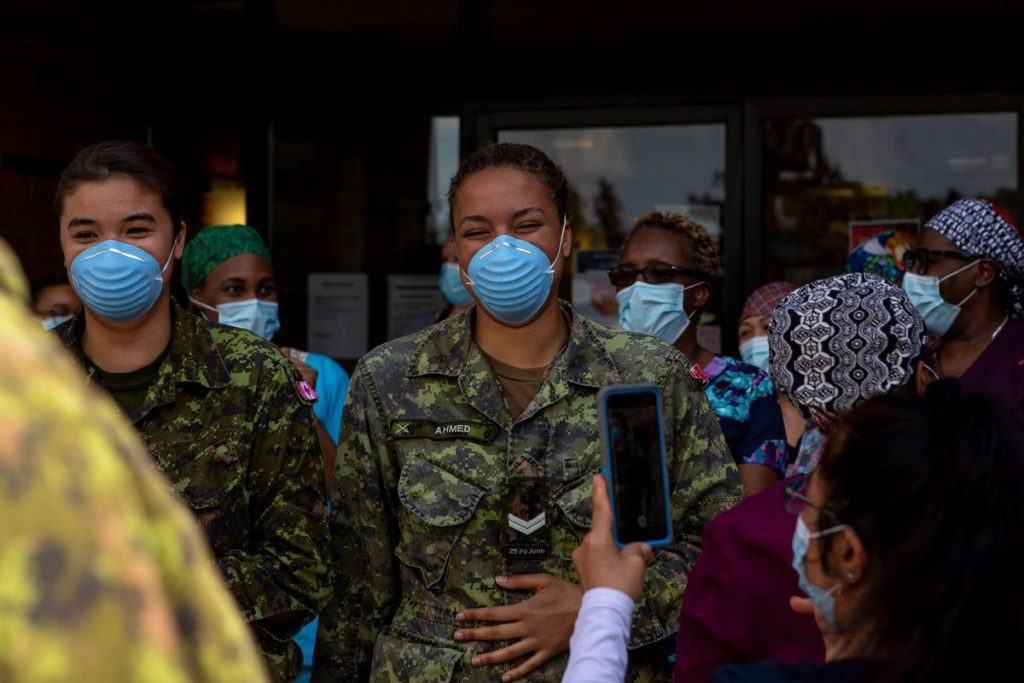Note: Pte. Evelyn Sanders is a pseudonym for a CAF member who requested anonymity.
Cpl. Laila Ahmed had a hunch she might be deployed long before any of us paid attention to COVID-19. “We knew there was a potential to be called upon for service back in February,” she says. “In March, as the pandemic continued to develop, civilian employers were notified about the possibility of an operation in the near future. And by the end of April, we were heading up to Borden to await details of our mission.”
When COVID-19 presented in Canada, the Canadian Armed Forces (CAF) immediately geared up for a number of deployment scenarios under a four-phase approach to pandemics. By early April, cases were at frightening levels in several long-term care homes in Quebec and Ontario. Following deployments to Quebec, Ontario Premier Doug Ford requested military personnel be activated into what he later described as shocking and horrific conditions.
Teams of 50 were sent into homes, consisting of nurses, medical technicians and other personnel. Overall, the military deployed more than 500 medical and support positions throughout Ontario. Cpl. Ahmed was one of them. A reservist with 25 Field Ambulance, Ahmed works as a Medical Assistant within the Health Services Branch of the Canadian military.
“What we heard initially was simply that we were needed,” Ahmed explains. “Long-term care homes were asking ‘Will you come?’. And we said, ‘Yes, we will come.’ ”

At the Canadian Forces Training Development Centre in Borden, Ahmed and her fellow soldiers underwent four days of intense geriatric-specific training including courses on elder care, feeding, safe movement, cognizant care and other health topics. They were then assigned to one of five long-term care homes identified as needing immediate assistance: Orchard Villa in Pickering, Hawthorne Place in North York, Altamont Care Community in Toronto, Eatonville Care Centre in Etobicoke, and Holland Christian Homes’ Grace Manor in Brampton. Over time, the list grew to also include Downsview Long Term Care Facility in North York and Woodbridge Vista Care Community in Woodbridge.
Upon arrival to one of the homes, Ahmed got right to work. “We assisted with activities of daily living, helping residents throughout the day,” she says. She and other members dressed wounds, administered medications, cleaned and bathed residents, and assisted with palliative care. “We wanted to give a sense of control and comfort to the residents we cared for and help them feel as dignified as possible.”
Ahmed also spent time assessing gaps in knowledge and addressing training issues with staff. She reviewed infection prevention and control protocols and standard use of protective gear.
Pte. Evelyn Sanders was also deployed. She worked nights as a medical technician. “There was a lot of death and suffering,” she says. “It made me sad to see how much nurses and social workers go through. They are attached to these residents and they have to see them suffer.” She pauses to collect her thoughts. “It was upsetting and very sobering,” she says. “There was just not enough staff to help all the residents.”
Her 12-hour shift began at 7 p.m. After donning scrubs and personal protective equipment, she assisted in any way she could. “If a resident needed a bath or their hair washed, we would do that,” she says. “We would brush their teeth and prepare their beds. Some residents were immobile so we checked on them hourly in case they needed to be changed or had other needs.”
By mid-May, the CAF released an observational report. Dubbed Operation LASER, the account painted a grim picture in Ontario – a story of overworked and undervalued staff trying desperately to keep up with the challenges of COVID-19. PPE shortages. Infected residents rooming together. Insect infestation. Erroneous charting and collection of vitals. Poor palliative care standards. Expired medication. Limited access to supplies and medical doctors.
“The report was exactly what we had said,” Sanders affirms. “Nothing was manipulated or changed. And that’s what the homes needed for change to happen … it caused Ontarians to see the real issues going on.”
Slowly, week-by-week, things began to stabilize. Provincial measures were introduced including emergency funding, new regulations, staffing supports and increased testing.
“Residents began to smile and laugh,” Sanders says. “And I felt really proud to be in the military and make a difference in these homes.”
“It doesn’t mean the underlying problems are necessarily resolved,” Cpl. Ahmed warns. “This is a long-standing and complex issue.”
The mission was to stabilize homes and provide an opportunity for staff to recover and resume management. “We were happy to serve fellow Canadians in a time of need and have an obligation to report our findings ethically and factually,” Ahmed says. “One can hope that from those findings, positive change can grow.”
Operation LASER was active from April 15 to Aug. 15. An exit report released earlier this month outlined that nearly all concerns raised by the CAF had been addressed and resolved. As of late August, COVID-19 related deaths in Ontario’s long-term care homes numbered 1,847.

Ahmed has since returned to civilian life. Including pre-deployment quarantine, training, deployment, and post-deployment quarantine with after-action reviews; Ahmed has been away from friends and family and anything resembling a normal life for nearly four months. But she feels it is worth the effort.
“It’s a multi-faceted issue,” Ahmed notes. “Operations must continue with safe, competent and ethical care. Staff must be trained properly and supported fully. And we must value our geriatric population. These little changes have the potential to improve outcomes and quality of life for the residents of long-term care homes in Ontario.”
Asked if she would deploy again, Ahmed doesn’t hesitate. “1,000 per cent,” she says. “There were lonely months, for sure,” she admits. “But it was for a good purpose. There was a need for us to be there. They called us in for a reason. And we were happy to go.”


The comments section is closed.
Hooray for our wonderful Health Services personnel in the Canadian Forces. Outstanding work! You DO make a difference